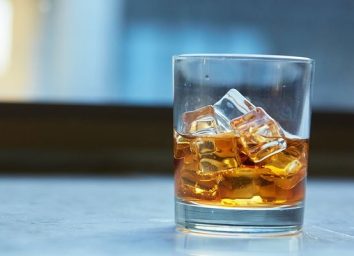20 Damaging Effects of Alcohol on Your Brain
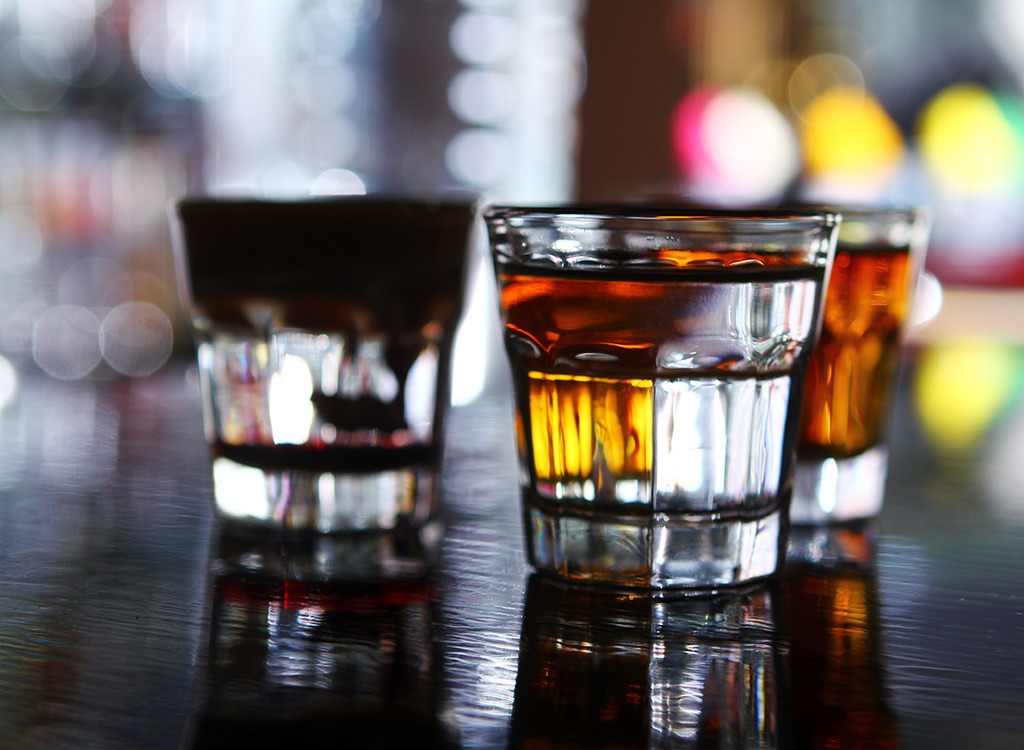
Have a glass of red wine or two on the weekend, and studies suggest you may improve your heart health. But drinking too much on the daily can have absolutely deleterious effects. The Dietary Guidelines for Americans recommend women enjoy up to one drink per day and men have up to two drinks per day. However, this doesn’t mean you can abstain from fancy cocktails all week just to down seven or more of them come Saturday night. That’s because alcohol dependency and binge drinking affect the brain in more damaging ways than you’d think.
Alcohol use was responsible for almost 3 million deaths globally in 2016, and it was also the leading risk factor for premature death and disability among people aged between 15 and 49, according to The Lancet. You can chalk that up to alcohol being a major catalyst to a slew of different health ailments, including stroke, heart disease, pancreatitis, liver cancer, and many disorders affecting the brain.
In order to get a better grasp on how alcohol affects the brain, we parsed a multitude of peer-reviewed studies and spoke to neuroscientist Bankole Johnson, MD, Chief Medical Officer at Adial Pharmaceuticals, Chair of the Department of Psychiatry at the University of Maryland School of Medicine, and leader of the Brain Science Research Consortium Unit at the University of Maryland, to get the scoop. Read on before your next happy hour.
It’s linked to depression.
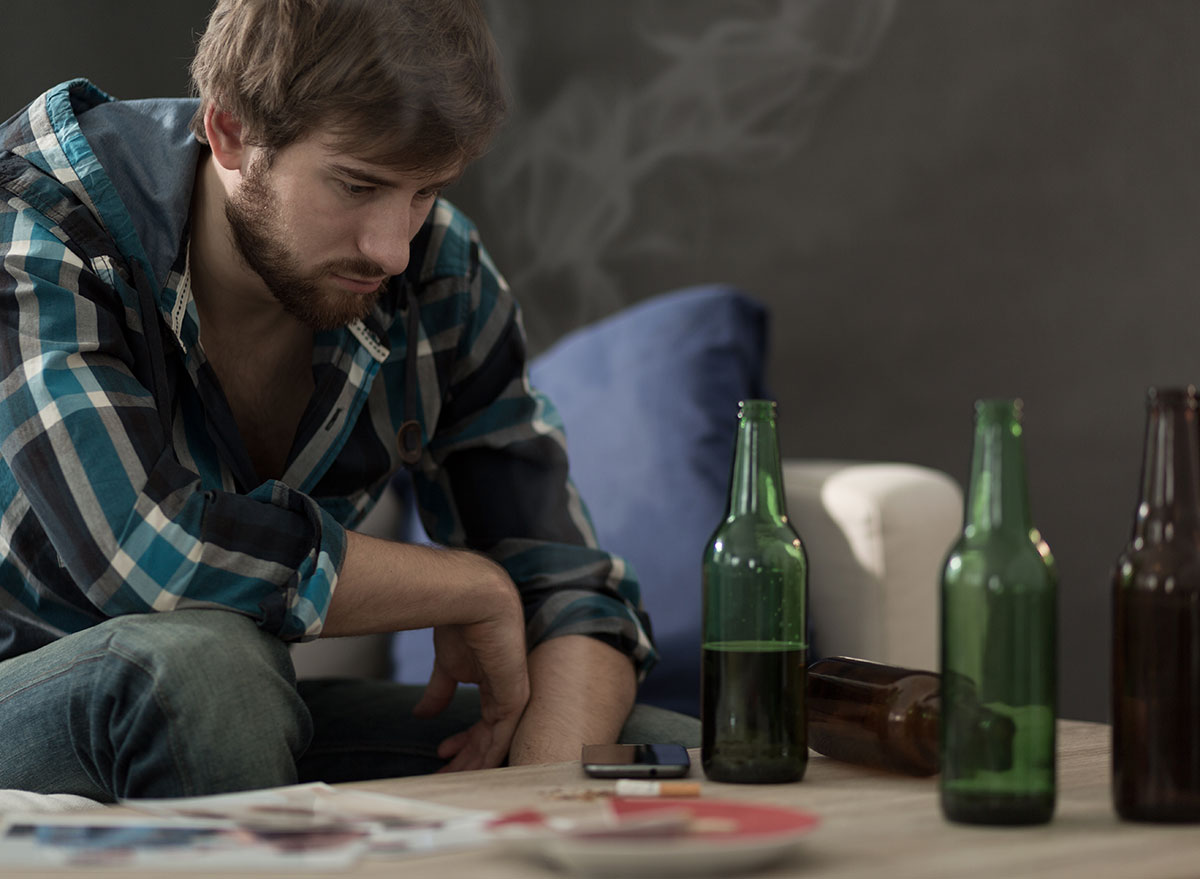
Despite the high you might get from throwing back a round of picklebacks, the exhilaration doesn’t last very long. In fact, a review in the journal Addiction sheds light on how drinking regularly is actually linked to depression. The analysis revealed that the presence of either alcohol use disorder or major depression doubled the risks of the second disorder—while alcohol use disorder increases the risk of major depression. Don’t count on a glass to perk you up.
Your brain shrinks.
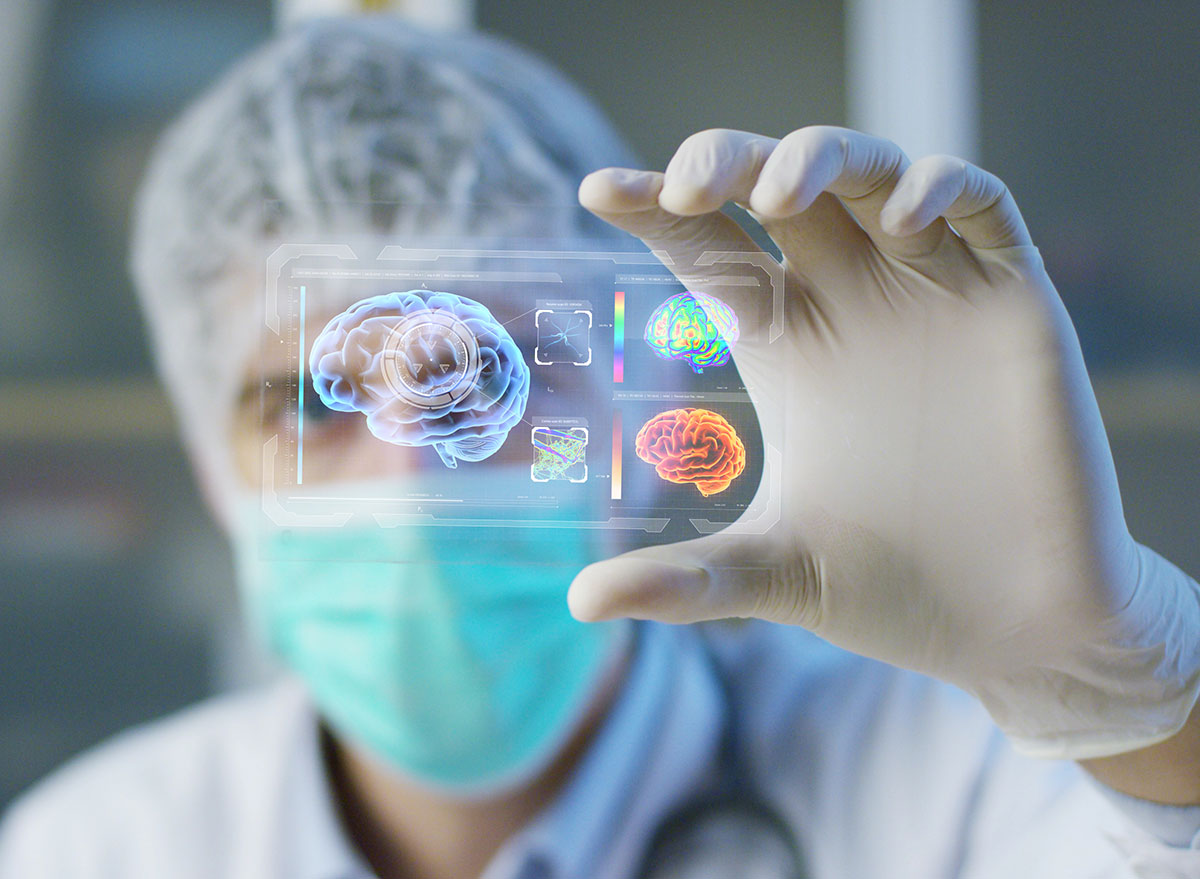
The more you drink, the smaller your brain becomes. The Framingham Offspring study reviewed MRI scans (which measure brain volume) of 1,839 people aged 34 to 88 who either abstained from alcohol altogether, used to drink, are low drinkers (one to seven drinks per week), moderate drinkers (eight to 14 drinks per week), or high drinkers (more than 14 drinks per week). The verdict: the more alcohol people drink on a regular basis, the lower their brain volume.
On average, for every increase in drinking category (for example, low drinkers to moderate drinkers), brain volume decreased by 0.25 percent. What’s more, folks who imbibe more than 14 drinks per week had an average 1.6 percent reduction in brain volume. However, there’s hope that the damage is reversible: a German study found that just three weeks of abstaining from alcohol significantly helped participants increase their brain tissue density. Researchers note that the reversibility was mostly influenced by participants’ age.
Your brain ages rapidly.

Come your next birthday, your brain may be blowing out fewer candles than it deserves. In the largest brain imaging study to date, scientists evaluated brain SPECT (single photon emission computed tomography) scans of more than 30,000 people ranging from as young as nine months old to 105-year-olds. The results revealed that alcohol abuse aged the brain by 0.6 years or 7.2 months. Other common habits and disorders that accelerate brain aging include schizophrenia, cannabis abuse, bipolar disorder, and ADHD, respectively, the study found. Ironically enough, you’ll find out below that many of these factors are also some of the damaging alcohol-induced effects on your brain.
You can black out.

This one’s no surprise—especially if you’ve ever skipped dinner and then proceeded to have one-too-many drinks at the bar. A study review in National Institutes on Alcohol Abuse and Alcoholism (NIH), had men consume 16 to 18 ounces of 86-proof bourbon—the equivalent of 11 to 12 shots—in about four hours. The subjects’ memory was tested with different stimuli, after which they were asked to recall details. While most of the men recalled the stimuli after two minutes, the more time that passed, the less they remembered. Half of the men reported not remembering any of the stimuli presented 30 minutes and 24 hours after the events.
In another study, seven hospitalized alcoholics were given access to booze. One participant’s blackout was so severe that one participant couldn’t remember hitting a man over the head with a chair. The study found that blackouts occur at BAC (blood alcohol concentration) levels as low as 0.14 percent and often begin around 0.20 percent. Blackouts lasted anywhere from nine hours to three days. “It is important to note that all the blackout periods occurred after a rapid rise in blood alcohol level,” the study author stated. You can take measures to avoid blackouts by drinking a glass of water after every alcoholic drink and making sure to eat before heading to the bar.
It can cause Korsakoff’s syndrome.

While you’re probably more in-the-know about the immediate effects of sipping too many cocktails (hello, hangovers and memory lapses), drinking too much can also cause more serious medical conditions. Korsakoff’s syndrome occurs when your body lacks vitamin B1 (also known as thiamine), a deficiency common in people who suffer from alcohol use disorder. The journal Neuropsychology Review defines this syndrome as a severe disorder characterized by permanent cognitive and emotional deficits. And according to the Alzheimer’s Association, thiamine deficiency can destroy brain cells and cause widespread microscopic bleeding and scar tissue that disrupts the brain from carrying signals among cells that are associated with storing and retrieving memories.
It impairs speech.

While one study found that alcohol can actually help you speak a second language better, the same positive effects don’t ring true for your native tongue. A study in Alcoholism: Clinical and Experimental Research shed light on how alcohol causes one of the most recognized effects—slurred speech. The study found that even moderate levels of alcohol significantly increased the difficulty of semantic access.
It slows hand-eye coordination.
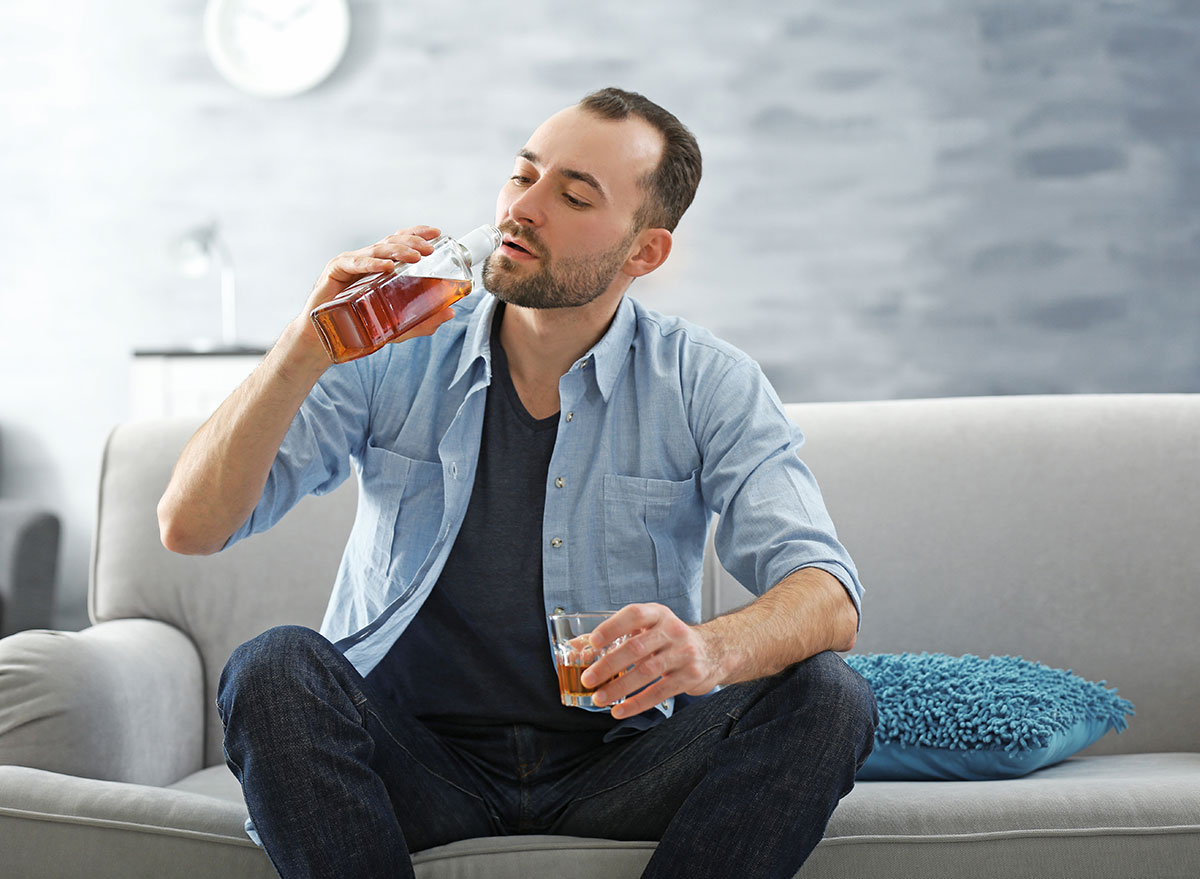
Maintaining your coordination after a few drinks is no easy feat—which is exactly why operating heavy machinery while intoxicated is illegal and why cops employ sobriety tests. In order to shed light on how your brain’s coordination ability is impaired while intoxicated, a study in the journal Alcohol studied brain scans of healthy social drinkers when they were sober and again when they were drunk. The researchers concluded that the brain’s connections between vision and movement-planning areas that are important for hand-eye coordination are weakened even after a BAC as low as 0.08 percent. The MRI scans revealed that imbibing resulted in decreased connectivity between the brain’s supplementary motor area (which is involved in planning and executing controlled movements) as well as the primary visual and motor areas.
It can trigger early on-set dementia.

Contrary to popular belief, dementia isn’t an ailment that only affects grandparents. While dementia affects five to seven percent of people aged 60 years and older, early-onset dementia can target people younger than 65. And a study in The Lancet found that alcohol use disorder is a major risk factor. Of the 31,624,156 adults discharged from French hospitals between 2008 and 2013, 57,353 (or 5.2 percent) of those diagnosed with dementia had early-onset dementia—and most of these cases were either alcohol-related or had an additional diagnosis of alcohol use disorders.
You can develop Marchiafava-Bignami disease.
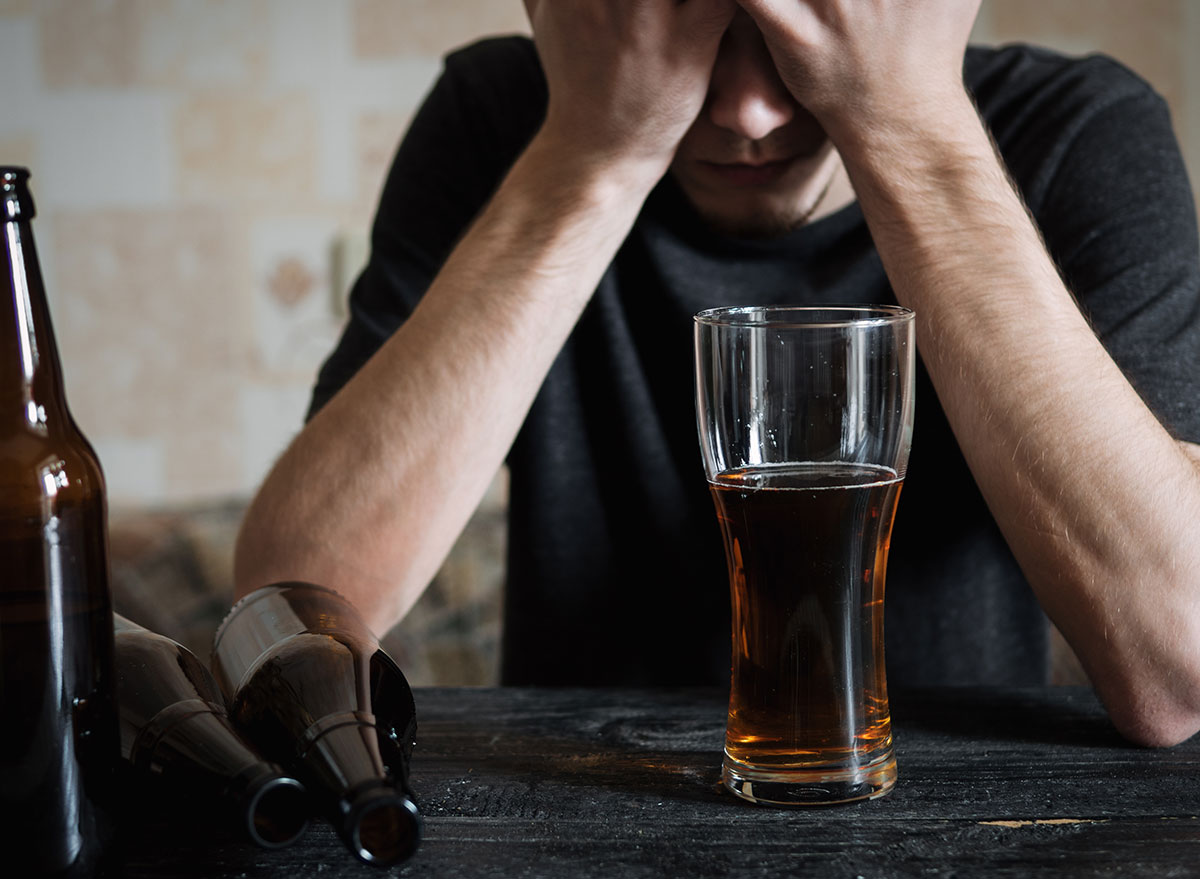
Marchiafava-Bignami disease is a brain disorder associated with alcohol abuse, Dr. Johnson exclusively tells us. “The disease leads to cell death and destruction of associative areas of the brain such as the corpus callosum. The theory is that chronic alcohol use leads to vitamin B deficiency. Thus, individuals with severe malnutrition also can have MB disease,” he tells us, adding that the disease is quite rare and that, currently, there is no specific treatment for it.
It can increase anxiety.

“Alcohol is sometimes used to decrease stress. With chronic use, however, there is desensitization of GABA neurons associated with its anxiolytic properties, with greater excitation of glutaminergic neurons that increase anxiety,” Dr. Johnson tells us. “Over time and with protracted withdrawals from alcohol, brain excitation becomes the more prominent neurological manifestation and leads to greater stress and risk of relapse.”
Plus, researchers at the University of Illinois at Chicago Center for Alcohol Research in Epigenetics discovered that alcoholism alters the expression of a protein crucial for the formation and maintenance of neural connections in the amygdala, which is the brain region associated with emotion, fear, and anxiety.
It can worsen bipolar disorder.

If you suffer from a mood disorder, chances are that drinking—even just a few drinks—can worsen it. A study in the Journal of Clinical Psychiatry studied 148 patients with bipolar I or II disorder over the course of two years and five months. Researchers found that as little as 1.2 drinks for women and 3.8 drinks for men worsened the symptoms of bipolarism. For women, the frequency of alcohol consumption was associated with lifetime episodes of depression and hypomania while wine consumption, specifically, was linked to lifetime hypomanic episodes and current manic symptoms. For men, total alcohol consumption was associated with lifetime manic episodes and emergency department visits while consumption of spirits was strongly associated with lifetime manic episodes as well as emergency department visits.
Another study found that bipolar I disorder (also known as mania) and alcohol use disorders are 6.2 times more likely to occur together. Researchers think that alcohol withdrawal in a person who is dependent may lead to the onset of bipolar disorder symptoms.
It increases stress.

It’s time to store away that Bloody Mary mix and step away from the tequila. A study in the journal Alcoholism: Clinical & Experimental Research found that chronic drinking leads to the production of cortisol, the hormone responsible for triggering stress. “Prolonged and elevated levels of glucocorticoid hormones can damage or destroy neurons, and lead to an increased vulnerability to other situations that can damage neurons, such as raised excitatory amino acid activity,” A.K. Rose, a lecturer in psychology at the University of Liverpool and corresponding author for the review, explains. “One of the most important questions for research and treatment is why alcoholics can relapse after many months of abstinence,” observed Littleton. “Partly this can be attributed to the effects of conditioning in which ‘cues’ provoke craving for alcohol, as well as a ‘protracted withdrawal syndrome’ which includes anxiety, sleep disturbances, and general feelings of being unwell.
Prolonged use of alcohol may even be the reason why people relapse after months of abstinence: “This can be attributed to the effects of conditioning in which ‘cues’ provoke craving for alcohol, as well as a ‘protracted withdrawal syndrome,’ which includes anxiety, sleep disturbances, and general feelings of being unwell,” says John Littleton, a professor in the department of pharmaceutical sciences at the University of Kentucky. “Prolonged high levels of brain cortisol after withdrawal from alcohol may explain the strength of these cues and many of the symptoms of protracted withdrawal.”
It impairs judgment.
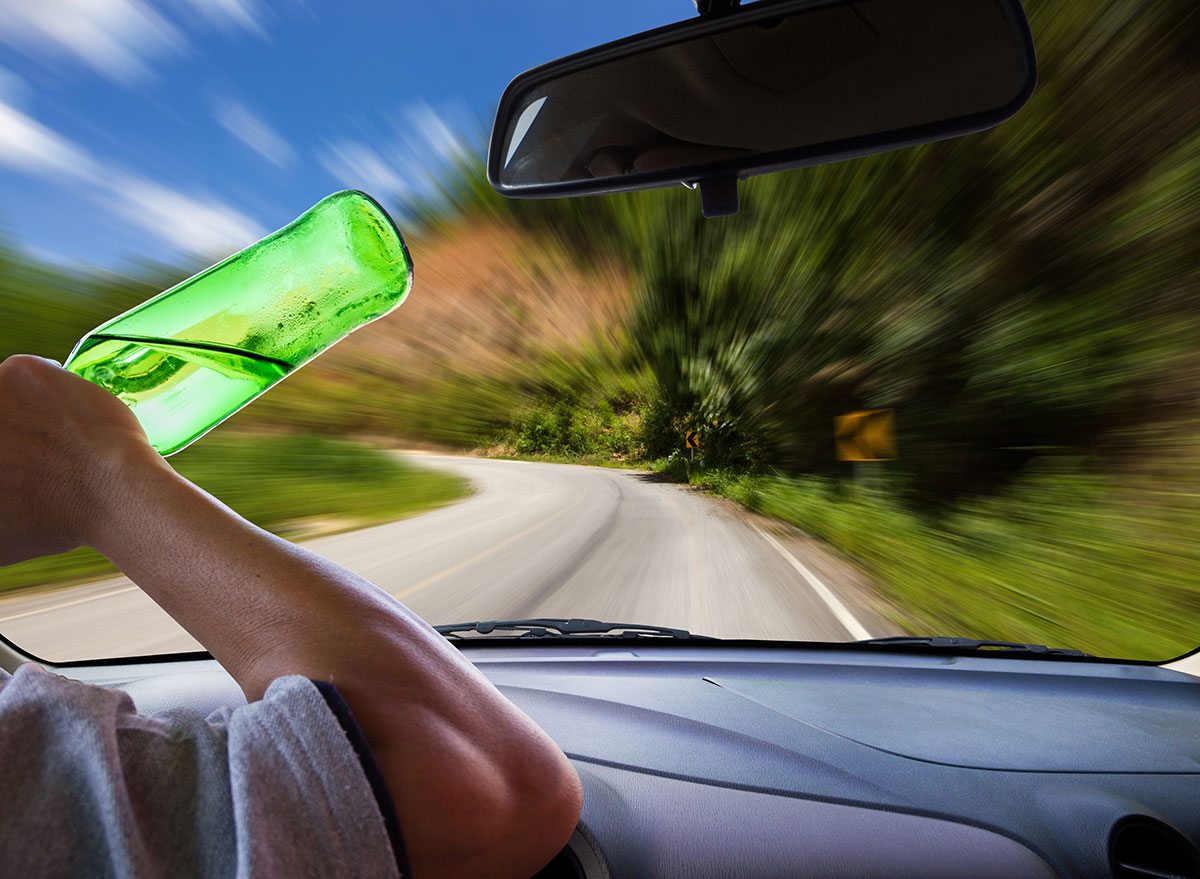
People usually associate college days with late-night parties and binge drinking. And while you may have regretted a few decisions you made while inebriated, these said behaviors have led science to make a little more sense of them. A study in Alcoholism: Clinical and Experimental Research tracked the drinking habits of college students and found that binge drinking at a younger age and prolonged binge drinking are associated with disadvantageous decision making. To come to this finding, researchers classified 200 college students into four different groups: low binge drinkers, stable moderate binge drinkers, increasing binge drinkers, and stable high binge drinkers who all took a stab at the Iowa Gambling Task (IGT). The results showed that the binge-drinking group made less advantageous choices on the IGT than the low binge-drinking group and that gender didn’t play a role in decision making.
It impairs formation of long-term memories.

According to a report in the NIH, drinking excessively can impair the formation of new long-term “explicit” memories of events and facts (such as names and phone numbers). Researchers concluded that people’s decreased ability to transfer info from short-term storage to long-term can begin at just one or two drinks.
“Alcohol’s effect is greater on short compared with long term memory but both can be affected,” Dr. Johnson tells us. “With short-term memory, there may be specific damage to a structure called the mammillary bodies. With chronic heavy alcohol use, there is impairment of neuronal transmission particularly in the pre-frontal cortex (which is associated with executive function and decision making), and alcohol-induced dementia can develop.” However, alcohol’s effect on memory take years of heavy drinking to develop, he tells us.
It can cause brain damage.
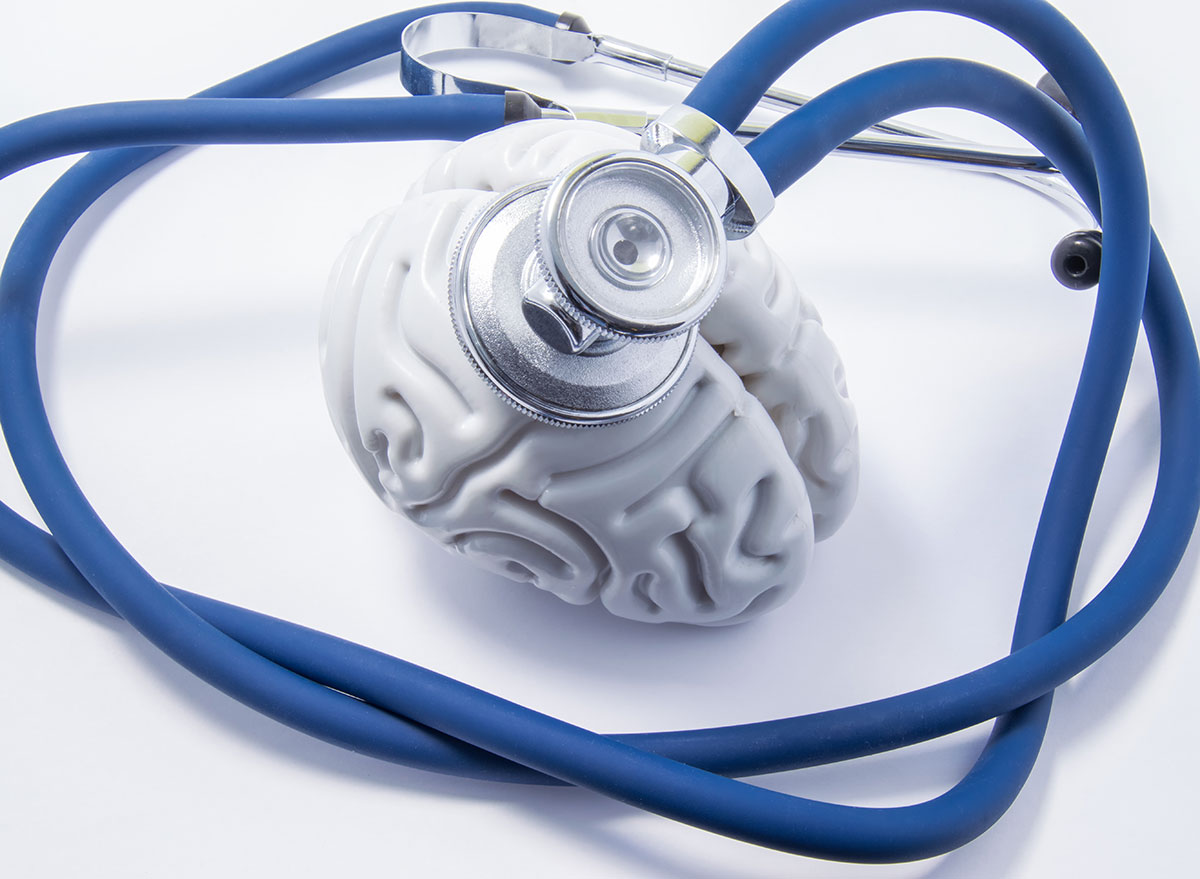
In a small study in the Journal of Cerebral Blood Flow and Metabolism, seven women and eight men drank alcohol until their BACs reached 0.05 to 0.06 percent, and then underwent MRIs. Creatine, which supports energy metabolism and protects brain cells, and choline, which is present in cell membranes, both decreased in the presence of alcohol. Researchers hypothesize that alcohol, therefore, triggers changes in cell membranes’ make-up. “Our follow-ups on the next day showed that the shifts in brain metabolites after moderate consumption of alcohol by healthy persons are completely reversible,” researcher Armin Biller at Heidelberg University Hospital says. “However, we assume that the brain’s ability to recover from the effect of alcohol decreases or is eliminated as the consumption of alcohol increases. The acute effects demonstrated in our study could possibly form the basis for the permanent brain damage that is known to occur in alcoholics,” he says, adding that additional studies should further investigate this.
It causes increased aggression.
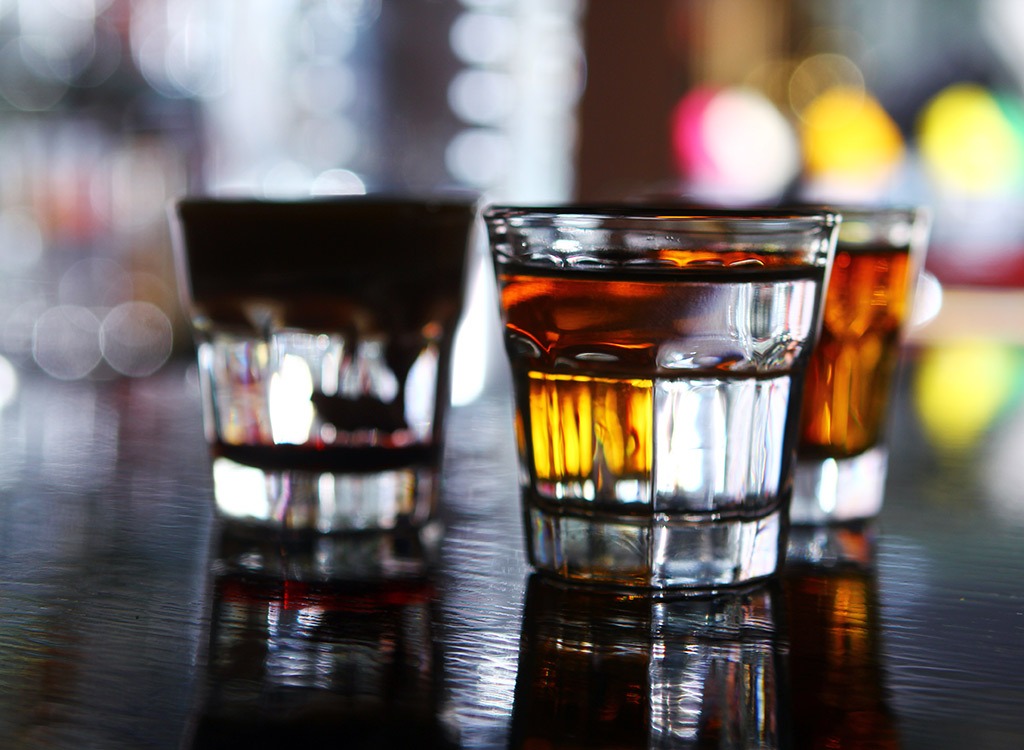
Most people’s personality quirks are exaggerated after a couple of cosmos—and aggression is no exception. While not everyone is a victim of aggression under the influence, research in NIH suggests that people with antisocial personality disorder (ASPD) may be more prone to alcohol-related aggression than people without the disorder. Researchers blame it on the booze altering multiple brain chemicals including neurotransmitters g-aminobutyric acid (GABA) and serotonin, which are both associated with aggressive behavior.
You become easily distracted.
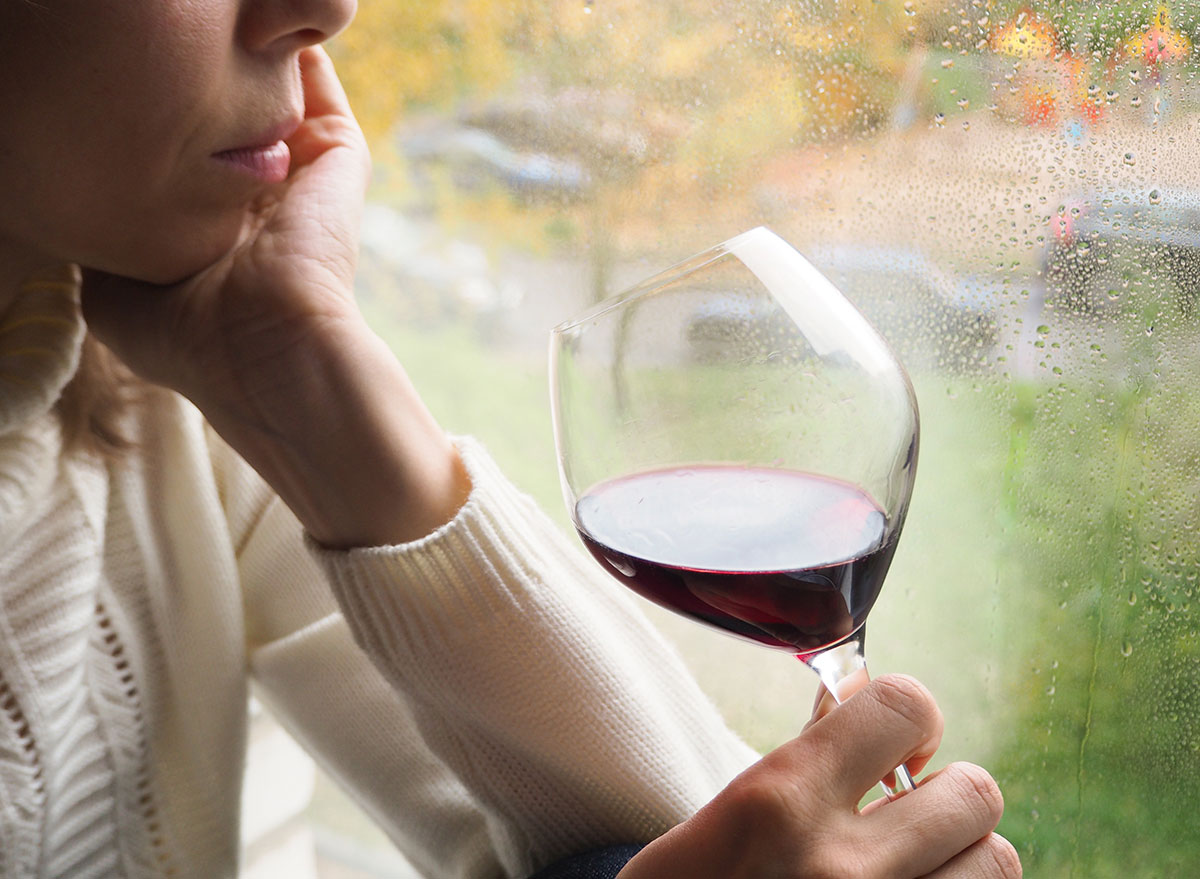
No surprise here: alcohol increases your vulnerability to distraction. So the next time your pal decides to lay a heavy story over some beers, just blame your lack of focus on science. A study in Biological Psychiatry found that alcoholics suffered from lower P3a, an index of attention—and that alcohol impaired the ability to focus on one thing while simultaneously ignoring extraneous information from distracting them from focus. Another study in Psychopharmacology found that P3a was suppressed by alcohol even with the lowest 0.3-gram-per-kilogram alcohol dose. These findings show that even a small amount of alcohol can cause involuntary attention shifting.
It leads to a lack of problem-solving skills.
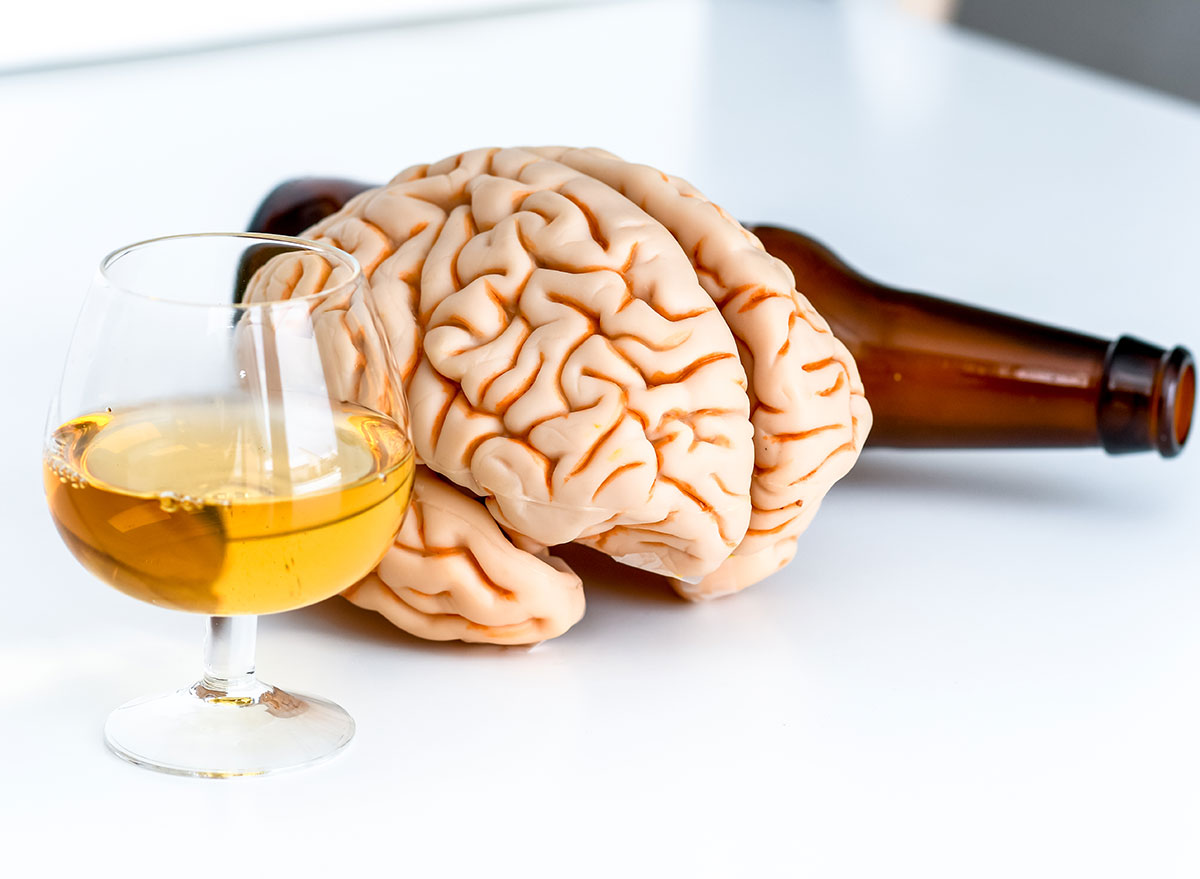
Researchers explored how the brain’s frontal lobe functions in people with chronic alcoholism via the Wisconsin Card Sorting Test and their notable findings were published in Psychiatry Research. The study’s conclusion reveals that alcoholics had the highest Inefficient Sorting scores—meaning that alcoholics often fail in finding a theme when solving a problem.
It can lead to alcohol dependence.
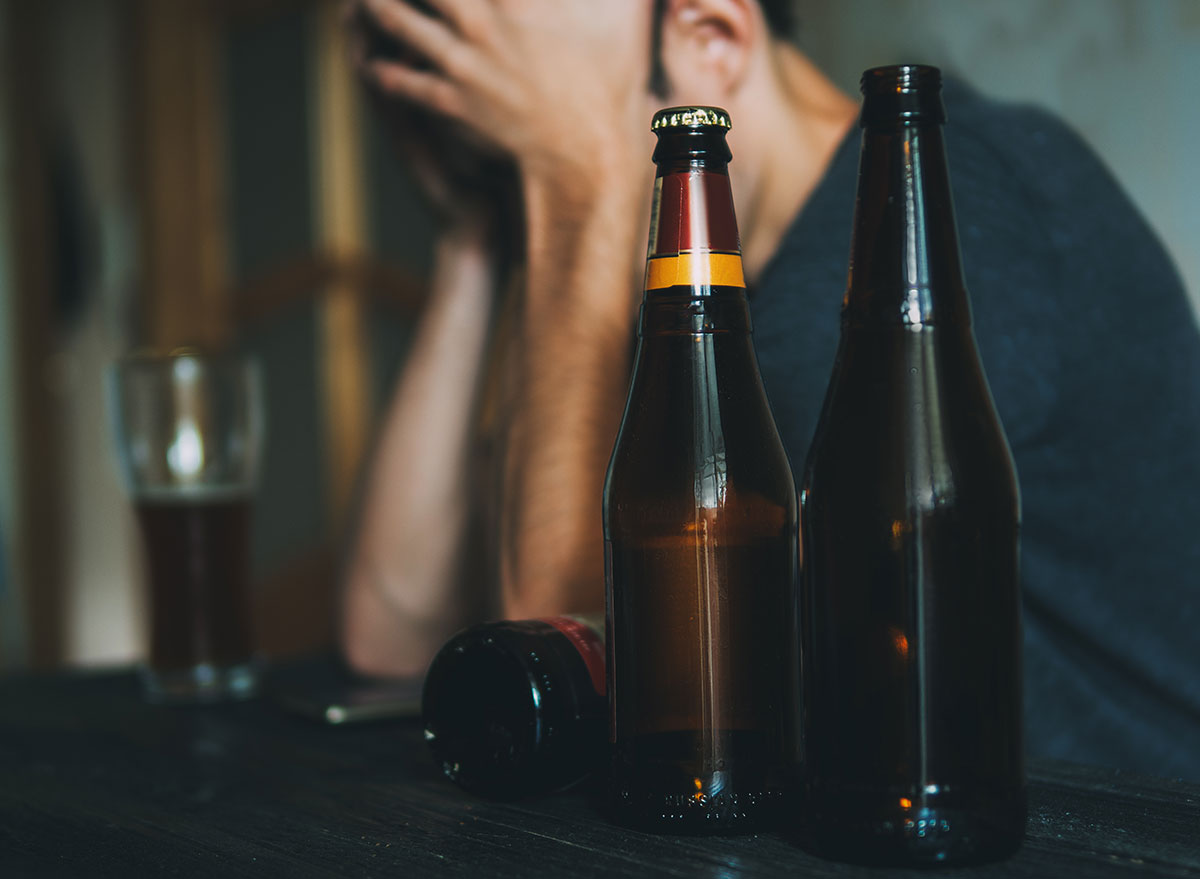
Children who begin drinking by age 13 have a 38 percent higher risk of developing alcohol dependence later in life, the American Psychological Association reports. How so? Teen brains are different: they’re more action- and emotion-oriented because the planning and inhibition centers take longer to develop, Sandra A. Brown, PhD, a psychology and psychiatry professor at the University of California, San Diego, explains.
A study in Alcoholism: Clinical & Experimental Research found that about 33 percent of people who reported to have started imbibing at age 17 or younger also reported experiencing alcohol dependence (AD) at some point in their lives. “Individuals who begin drinking at 17 or younger are more than three times more likely to develop AD than those who begin at age 21 or older,” Richard A. Grucza, an epidemiologist at Washington University School of Medicine and the study’s corresponding author, explains. “One compelling perspective is that people who are at high genetic risk for AD begin drinking earlier for the same reasons that they develop AD. For example, they may be more impulsive, prone to greater risk-taking, have a harder time controlling their behavior, and so on. Since delaying AOD (age at onset of drinking) by itself wouldn’t change these other factors, it wouldn’t necessarily lead to reduced AD,” Grucza says.
You’ll have slower movements.
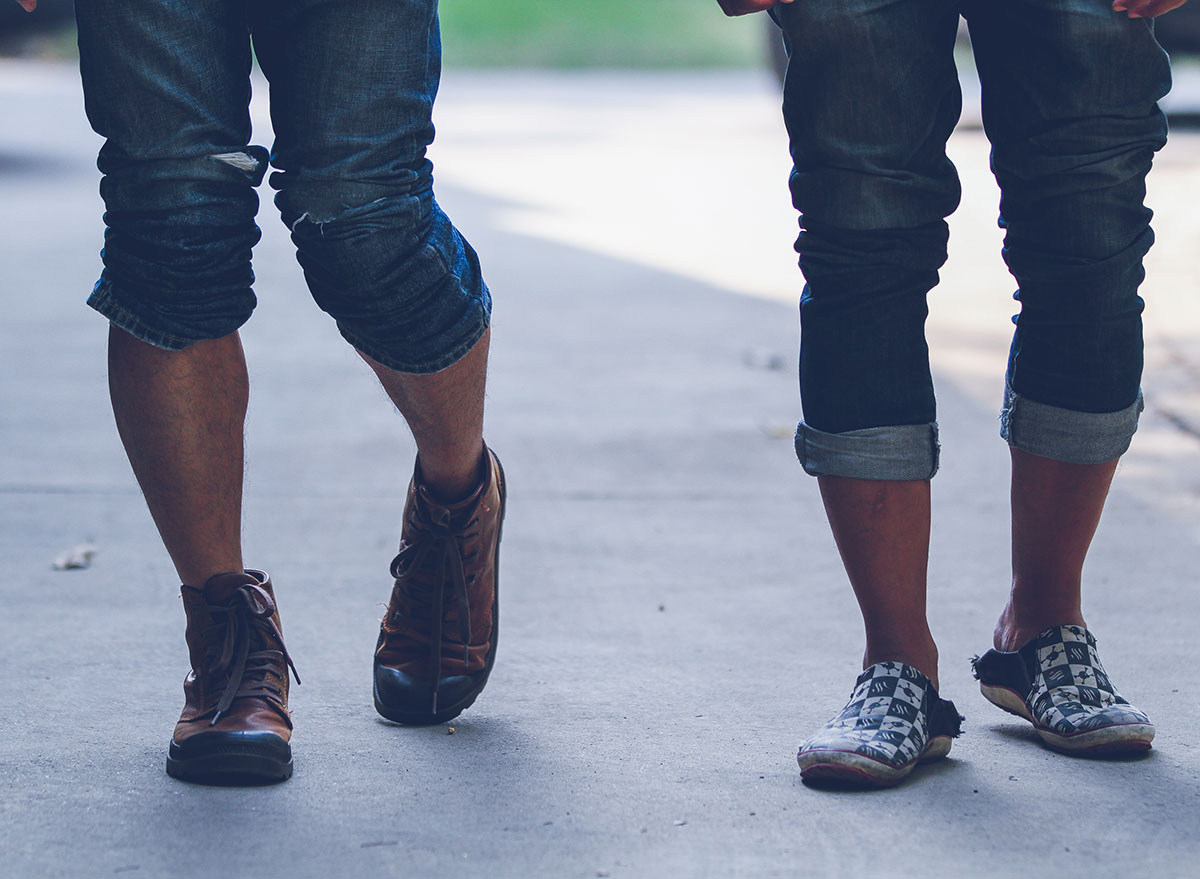
According to a study in the British Journal of Anesthesia, ingesting alcohol leads to the slowing down of thought and physical movements, also known as psychomotor impairment. The findings revealed that general alertness and motor speed (known as choice reaction time) and dual-task secondary reaction time (such as in multitasking) both deteriorated with increasing BAC.



